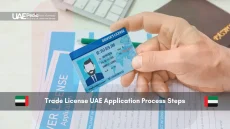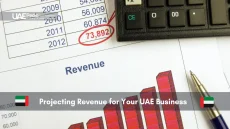Did you know the UAE ranks among the top in the Middle East for ease of doing business? While its tax reforms like the 9% corporate levy above AED375,000 make headlines, opportunities still shine brighter than Dubai’s skyline. This guide walks you through every sand dune and spreadsheet.
Gone are the days of mandatory local sponsors – 100% foreign ownership now fuels ventures from tech startups to limited liability companies. Whether you’re eyeing office space in heritage-rich Abu Dhabi or a free zone near Jebel Ali Port, digital platforms like the Basher portal enables business setup within 15 minutes. Shukran to smart government initiatives!
We’ll decode it all:
- How to choose between mainland, free zones, or offshore setups
- Step-by-step application processes (documents checklist included)
- Banking tips and visa strategies for your team
Ready to turn “inshallah” into “done deal”? Let’s begin.
Navigating the UAE Business Environment in 2025
Imagine a place where Bedouin traditions meet blockchain ambitions – that’s today’s Emirates. The secret sauce? A cocktail of forward-thinking policies and cultural awareness that turns sand into opportunity.
Economic Policies and Government Initiatives Shaping Business
Dubai’s Virtual Commercial City Program proves the game has changed. Over 200 nationalities fuel innovation here, with digital platforms like Basher slashing red tape. The Department of Economic Development (DED) now processes 87% of licenses online – no more endless paperwork marathons.
Recent tax reforms? They’re reshaping strategies. As of 2025, mainland companies are subject to a 9% corporate tax on profits exceeding AED 375,000, while Free zones offer tax incentives, subject to compliance with specific regulations. Abu Dhabi’s initiatives, like Hub71, have attracted significant startup funding. That’s your signal where the wind’s blowing.
Qualifying Free Zone Persons (QFZPs) can maintain a 0% corporate tax rate on qualifying income, provided they meet specific criteria set by the Federal Tax Authority, including conducting core income-generating activities within the free zone and meeting substance requirements. Ref.: “Alaan. (2025). UAE Corporate Tax For Free Zone Person Explained. Alaan.” [!]
Cultural Norms and Regulatory Compliance in the UAE
Your trade name needs DED approval – no religious references, no celebrity nods. During Ramadan? Shorten meetings and avoid lunchtime pitches. Pro tip: Emirati partners appreciate relationship-building over rushed Zoom calls.
Three things expat investors often miss:
- Local registration requires Arabic-English documentation
- Commercial licenses dictate allowed activities
- Free zones have stricter visa quotas than mainland setups
As one Dubai-based CEO told me: “Respect the process, and the process respects you.” Wise words for navigating this land of contrasts.
Free Zone visa quotas are typically linked to office space size; for instance, a small office might allow only 2-3 visas, while larger offices can accommodate more employees. This contrasts with mainland companies, where visa quotas are more flexible and dependent on the Ministry of Human Resources and Emiratisation’s assessments. Ref.: “Filings.ae. (2025). Key Differences Between Free Zone and Mainland Visas in Dubai. Filings.ae.” [!]
Key Steps to Launching a Business in the UAE
Ever wondered why Dubai’s business scene buzzes like a souk at sunset? It’s all about nailing three foundation stones first – let’s map yours.
1. Crafting Your Business Identity
Your trade name is your first handshake with customers. Dubai’s Department of Economic Development (DED) rejects 23% of names for cultural mismatches – avoid religious terms or random celebrity nods. Pro tip: Test your chosen name with local friends first!
The UAE offers various license types, including Commercial, Professional, Industrial, Tourism, Agricultural, and Healthcare:
- Commercial (goods trading)
- Professional (services)
- Industrial (manufacturing)
- Tourism
- Agricultural
- Healthcare
Choose wrong, and you’ll face approval delays. A consulting firm can’t operate under a commercial license – match your activities precisely.
2. Building Your Legal Framework
LLCs in the mainland can now have 100% foreign ownership in many sectors. But wait – free zones allow 100% foreign control. We’ve seen clients save AED15k+ by picking the right structure early.
Three common setups:
- Limited liability company (7+ shareholders)
- Sole proprietorship (1 owner, full liability)
- Civil company (professionals like architects)
Your director’s passport copy and capital proof get filed with the memorandum of association. Budget AED20k-30k for smooth registration.
3. Securing Your Golden Ticket
That shiny license? It starts with initial approval from authorities. Gather:
- Notarized MOA (memorandum of association)
- Local service agent agreement (if required)
- Pre-approval receipt from DED
One client learned the hard way: “We submitted Arabic documents without English translations – lost three weeks,” recalls Ravi, a tech startup founder. Double-check every comma in your application!
Pro move: Request external approvals early if your business involves food, healthcare, or education. Some take 45+ days.
Selecting the Appropriate Business Structure in the UAE
At a Dubai crossroads where desert wisdom meets corporate strategy, your legal framework becomes your compass. Recent reforms like 100% foreign ownership in mainland sectors have reshaped the playing field – but which path suits your venture?
LLCs vs. Partnerships vs. Civil Companies: By the Numbers
Let’s crack open three common structures like dates at a majlis:
| Structure | Ownership | Liability | Minimum Capital | Best For |
|---|---|---|---|---|
| Limited Liability Company | 2-50 shareholders | Up to invested amount | None* | Retail, manufacturing |
| Partnership | 2+ general partners | Unlimited | Varies by agreement | Family businesses |
| Civil Company | Professionals only | Personal assets at risk | None | Consulting, medical services |
*While no minimum capital exists for most mainland LLCs since 2021, free zones may require AED 50k+.
“Choosing between structures is like picking a camel – match the breed to your journey. Tech startups often gallop as LLCs, while architects trot as civil companies.”
The Department of Economic Development plays referee here. Their registration portal flags mismatches between your activities and chosen type. A marketing firm can’t operate under a civil license – alignment matters.
Pro tip: LLCs now allow full foreign control in 1,500+ sectors. But partnerships still need 51% Emirati ownership outside free zones. Your trade name approval hinges on this choice too – “Desert Tech LLC” flies; “Desert Tech Civil Company” crashes.
Understanding Free Zones and Economic Zones in the UAE
What if your office could overlook camel races and cargo ships simultaneously? Welcome to the UAE’s specialized zones – innovation hubs where global investors craft unique ventures. Let’s unpack these sandbox economies.
Your Passport to Tax-Free Operations
Free zones like Dubai’s DMCC offer more than Instagrammable skylines. They’re golden tickets for:
- 100% foreign ownership without local sponsors
- Zero corporate/personal taxes (when qualifying)
- Customs duty exemptions on imports/exports
Jebel Ali Free Zone (JAFZA) processes applications in 48 hours – faster than ordering a Tesla here. Setting up a business in free trade zone often requires less capital than mainland ventures. But watch sector restrictions – media firms thrive in Dubai Studio City, not industrial parks.
Jurisdiction Showdown: Where to Plant Your Flag
Three paths diverge in the desert:
| Feature | Mainland | Free Zone | Offshore |
|---|---|---|---|
| Local Partner | Required* | None | None |
| Tax Liability | 9% over AED375k | 0% | 0% |
| Physical Office | Flexible | Mandatory (flexi-desks available) | Not required |
*Except for 1,500+ sectors allowing full foreign ownership since 2021.
Abu Dhabi’s twofour54 free zone proves ideal for media companies, while Ras Al Khaimah Economic Zone (RAKEZ) suits manufacturers. Pro tip: Offshore entities can’t conduct local trade – perfect for holding assets or international services.
“Choosing a zone is like dating – compatibility matters most. Tech startups swipe right on Dubai Internet City, while logistics firms match with JAFZA.”
The government streamlines approval through dedicated portals. Sharjah’s Hamriyah Free Zone Authority even offers pre-approved documents templates. Just remember: free zone business licenses limit mainland operations unless you establish a branch.
“read more: Business Marketing Abu Dhabi Strategies That Work“
Office Space Options and Licensing Requirements in the UAE
Picture your company name etched on a sleek office door – but which door unlocks success? In the Emirates, your workspace isn’t just four walls. It’s your golden ticket to visa allocations, credibility, and even registration approvals. Let’s explore how to plant your flag here.
Desk Dreams Made Simple
Dubai’s RERA requires mainland lease contracts to be notarized, while free zone flexi-desks skip that step. Options vary like desert landscapes:
| Package | Locations | Perks |
|---|---|---|
| Flexi-Desk | Dubai Internet City Abu Dhabi Global Market |
6 visas included AED 15k/year |
| Serviced Office | DIFC Twofour54 |
24/7 access Meeting room credits |
| Custom Build | JAFZA RAKEZ |
Branded signage Unlimited visas* |
*Based on office square footage
Gather these documents before signing:
- Passport copies of all directors
- Ejari registration (Dubai mainland)
- DED preliminary approval (now under the Department of Economy and Tourism – DET)
Abu Dhabi’s Masdar City offers solar-powered spaces with fast-tracked application reviews. One tech founder shared: “Our Masdar office helped secure 10 employee visas in 11 days – faster than my Amazon Prime deliveries!”
Three lease traps to avoid:
- Hidden municipality fees (up to 5% annual rent)
- Restrictions on activities outside your license
- Auto-renewal clauses without exit options
Your office address directly impacts government processing times. Mainland setups often require physical inspections, while free zone virtual offices speed up the process. Pro tip: Compare package deals during summer months – landlords often offer rent-free periods!
Financial Planning and Taxation Updates in the UAE
Numbers shape strategies here like desert winds shape dunes. While the UAE’s tax landscape evolves, smart planning turns reforms into opportunities rather than obstacles. Let’s chart your fiscal path through this shifting terrain.
While free zone companies benefit from tax exemptions, they are generally restricted from conducting business directly with the UAE mainland market unless they engage a local agent or distributor, potentially limiting market reach. Ref.: “Smart Zone®️. (2025). Dubai Mainland vs Free Zone | Easy Guide for 2025. Smart Zone®️.” [!]
Your Practical Tax Compass
Since June 2023, mainland ventures face 9% corporate tax on profits over AED375k. But free zone companies? They can still dance at the zero-tax ball – if they avoid mainland trade and meet government criteria. One client saved AED280k annually by structuring as a DMCC free zone entity with offshore operations.
Three financial anchors every investor needs:
- Initial capital of AED20k-30k covers licenses, visas, and registration
- Local bank accounts require passport copies and documents from the DED
- Exemption applications demand six months of audited financials
“Treat tax planning like camel milk – fresh and regular. We review client structures quarterly to maintain compliance and optimize liabilities.”
Abu Dhabi’s economic development initiatives now offer rebates for tech companies investing in AI research. The process? Submit project proposals through the Department of Economic Development portal within fiscal year deadlines.
Pro tip: Maintain separate bank accounts for operational costs and capital reserves. Digital tools like Dubai’s Corporate Tax Portal simplify filings – but always keep Arabic/English financial records handy for approval checks.
Administrative and Legal Procedures for Business Setup
Ever felt like legal paperwork could rival Dubai’s maze-like souks? Here’s your treasure map. Let’s transform bureaucratic hurdles into checkmarks with clear steps and cultural know-how.
Registration Processes and Document Preparation
The registration journey starts with three golden steps:
- Submit initial application through the Department of Economic Development portal
- Attach notarized MOA and UAE legal documents (passport copies, capital proof)
- Await final approval for license printing
Dubai-based entrepreneur Sara recalls: “We thought English MOAs sufficed – wrong! Arabic translations cost us two weeks.” Always double-check document requirements with local chambers of commerce.
“read also: Motivation in UAE Workplaces Effective Strategies“
Compliance with UAE Naming Conventions and Licensing Laws
Your trade name isn’t just branding – it’s a legal handshake. The government rejects names referencing religions or mimicking existing companies. Abu Dhabi’s DED once nixed “Desert Prophet LLC” but approved “Sand Innovators FZE.”
Three compliance musts:
- Verify name availability online first
- Ensure alignment with licensed activities
- Include legal structure (LLC, FZE, etc.)
“Treat naming like camel milk – fresh but traditional. We guide clients to blend modernity with cultural respect.”
Struggling? Local law firms offer support packages covering document attestation and bank account setup. Their services often pay for themselves in saved time and avoided resubmissions.
“Read also: Business Marketing Consultants UAE Selection Criteria“
Next Steps: Advancing Your Business in the UAE
As the sun sets over Abu Dhabi’s mangroves, your entrepreneurial vision rises – let’s chart its flight path. You’ve navigated license types, registration portals, and free zone perks. Now’s the moment to transform plans into action.
Finalize your company structure with the precision of a falconry trainer – LLCs for retail ventures, civil setups for consultancies. Secure that office space aligning with your activities, whether a flexi-desk in Dubai Internet City or a custom warehouse in RAKEZ. Remember: your address impacts visa allocations and government processing speed.
Read More:
The process thrives on preparation. Double-check documents like a goldsmith inspecting pearls – attested MOAs, translated registration papers, DED approval receipts. Need guidance? Local support firms streamline everything from mainland company setup to capital investment strategies.
Embrace this truth: structured ventures here don’t just survive – they soar. With 2,000+ activities available and residence permits for investors, your ambitions meet their runway. Ready for takeoff? Explore deeper resources, connect with experts, and watch your business eclipse Burj Khalifa’s shadow.
Register through the Department of Economic Development (DED) portal after securing trade name approval, office space lease, and shareholder agreements. Most LLCs require 51% local ownership, but free zones offer 100% foreign ownership options.
Free zone licenses typically restrict physical operations to that zone. For mainland access, you’ll need a commercial agent or distributor partnership approved by the DED. Many tech and service-based businesses use hybrid models for flexibility.
Mainland companies require physical office addresses, while free zones offer flexi-desks from AED 15,000/year. Abu Dhabi’s Hub71 and Dubai’s in5 provide subsidized tech spaces—perfect for startups testing the market.
Beyond the AED 5,000–30,000 license fees, budget for notarized MOUs (AED 500+), visa deposits (AED 3,000–5,000 per employee), and PRO services. Free zones often bundle these into package deals—compare ADGM’s vs. twofour54’s pricing sheets.
Healthcare, education, and media ventures need ministry-level clearances. Even e-commerce platforms selling certain goods require Customs Authority codes. The DED’s interactive activity list flags restricted sectors upfront.
Since June 2023, profits over AED 375,000 face 9% tax, but free zone-qualifying income remains exempt. Startups can deduct up to AED 75,000 in licensing costs. Always consult a registered tax agent during structuring—Mazars and Aurora50 offer tailored advice.
Yes! File with the Ministry of Economy’s Trademark Office for UAE protection (AED 8,700+). GCC-wide registration adds AED 12,000. Pro tip: Check the “UAE Trade Name Index” first—names like “Royal” or “Emirates” need special approval.
Most licenses include 1–3 investor visas renewable every 3 years. Employees get 2-year residency under your quota. Golden Visas (10 years) now extend to startup founders raising AED 1M+—ADGM’s RiseUp program fast-tracks eligible applicants.


















